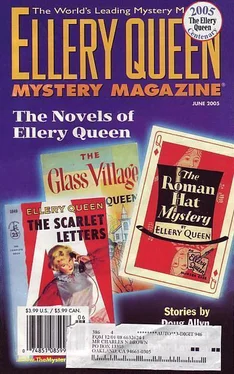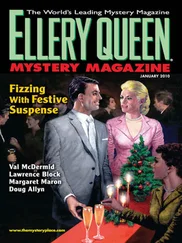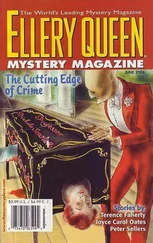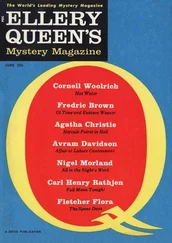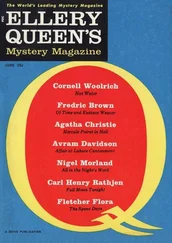Doug Allyn - Ellery Queen’s Mystery Magazine. Vol. 125, No. 6. Whole No. 766, June 2005
Здесь есть возможность читать онлайн «Doug Allyn - Ellery Queen’s Mystery Magazine. Vol. 125, No. 6. Whole No. 766, June 2005» весь текст электронной книги совершенно бесплатно (целиком полную версию без сокращений). В некоторых случаях можно слушать аудио, скачать через торрент в формате fb2 и присутствует краткое содержание. Город: New York, Год выпуска: 2005, ISBN: 2005, Издательство: Dell Magazines, Жанр: Детектив, на английском языке. Описание произведения, (предисловие) а так же отзывы посетителей доступны на портале библиотеки ЛибКат.
- Название:Ellery Queen’s Mystery Magazine. Vol. 125, No. 6. Whole No. 766, June 2005
- Автор:
- Издательство:Dell Magazines
- Жанр:
- Год:2005
- Город:New York
- ISBN:ISSN 1054-8122
- Рейтинг книги:3 / 5. Голосов: 1
-
Избранное:Добавить в избранное
- Отзывы:
-
Ваша оценка:
- 60
- 1
- 2
- 3
- 4
- 5
Ellery Queen’s Mystery Magazine. Vol. 125, No. 6. Whole No. 766, June 2005: краткое содержание, описание и аннотация
Предлагаем к чтению аннотацию, описание, краткое содержание или предисловие (зависит от того, что написал сам автор книги «Ellery Queen’s Mystery Magazine. Vol. 125, No. 6. Whole No. 766, June 2005»). Если вы не нашли необходимую информацию о книге — напишите в комментариях, мы постараемся отыскать её.
Ellery Queen’s Mystery Magazine. Vol. 125, No. 6. Whole No. 766, June 2005 — читать онлайн бесплатно полную книгу (весь текст) целиком
Ниже представлен текст книги, разбитый по страницам. Система сохранения места последней прочитанной страницы, позволяет с удобством читать онлайн бесплатно книгу «Ellery Queen’s Mystery Magazine. Vol. 125, No. 6. Whole No. 766, June 2005», без необходимости каждый раз заново искать на чём Вы остановились. Поставьте закладку, и сможете в любой момент перейти на страницу, на которой закончили чтение.
Интервал:
Закладка:
When Kachani stepped into St. Paul’s Church, he felt none of the awe he would have twenty years earlier. A lone figure knelt in front of the crucifix at the far end of the church. Kachani and Chundira approached Archbishop Mpocha. His skin was an inky black that seemed to blend into the suit he wore. His priestly collar was a thin white island in an opaque sea. He did not respond to their approach. His head remained bowed, his expression solemn. His mouth moved soundlessly.
It was a long prayer. Eventually the archbishop’s eyes opened and he rose. His wrinkled face, greying beard, and penetrating stare made him look impossibly old. “I was praying for forgiveness.”
Chundira jumped at the bait. “A great man like you doesn’t need forgiveness.”
“I took a life,” Archbishop Mpocha announced. “Even a man as vicious as Ebeso was a child of God.”
“You did Malawi a glorious service. It was a—”
“Why were you at the palace?” Kachani cut in.
“I had a meeting with Ebeso about the demonstrators he imprisoned last week.”
“So after years of standing silent while he imprisoned and executed thousands, what was it about the latest incarcerations that moved the Church to action?”
“I’m sorry,” Patrick said desperately. “Please excuse him, he—”
“Do you think this is the first time I have heard insults like that?” The archbishop was unruffled. The only part of him that moved were the fingers of his left hand. They played absently with the hem of his suit. “Blaming the Church is an easy thing for frustrated people to do. We did not stay silent.”
“You’re right,” Kachani replied. “The Church was very vocal in supporting Ebeso. Whenever he ordered a judge removed or one of his rivals disappeared, the Church would denounce that person and every congregation in Malawi would hear how that man had been a sinful Judas.”
Archbishop Mpocha’s gaze still had a calm, superior veneer. He smiled as one would to a silly child. “So you are so much more righteous? While Ebeso was in power, how many murder investigations did you end prematurely when the evidence led to Ebeso’s cabinet? And what did the police ever do when the people committing violence were Ebeso’s followers?”
Kachani opened his mouth to reply but the archbishop held up his hand. “On some level, everybody collaborated with Ebeso. It is easy to say, ‘You should have stood up to him, you shouldn’t have been silent,’ but we were all afraid. Of course we were. We did not want to be the next one eliminated. The most anyone could do was find ways to do some good within the restrictions. I was guilty every day because the Church had to support Ebeso and turn a blind eye to his deeds. Yesterday I had been pushed too far. When Ebeso went to the toilet, I knew he was vulnerable for once.”
Kachani struggled to control his anger and think logically. “You were carrying a gun?”
“Yes.”
“Why? If you didn’t plan to kill him, why would an archbishop be carrying a gun?”
“Malawi is not as safe as it once was. I am ashamed to admit it, but I sometimes have to carry a gun.”
“Weren’t you searched when you arrived at the residence?”
“The guards who let me through were Catholic. My word was enough for them.”
“Where is the gun now?”
“I panicked. I threw it away.”
“Where?”
“I’m not sure. Somewhere on my drive back here.”
Convenient, thought Kachani. “Where did you meet him?”
“In his study.”
“And how did he react when you brought up the incarcerations.”
“He told me he did not care what I thought. That’s why when he got up to go to the toilet—”
“You followed him down the corridor and shot him. In the toilet.”
“Yes.” The archbishop’s restless fingers were now threading the rosary around his neck.
“Think about this. Are you saying that’s what happened? You walked down the corridor after him, and shot him in the bathroom.”
“Yes.”
“We’re done,” Kachani said to Patrick and began to walk away. “He didn’t kill Ebeso.”
“What?” the archbishop objected. He finally sounded angry, and this pleased Kachani.
Chundira remained in the church for a few minutes more — probably apologising and grovelling. He was enraged when he exited. “You can’t talk to him that way.”
“It’s how he deserves to be talked to. Have you seen the house he lives in? He has a legion of servants, a pool, and a satellite dish. Many Malawians share a loaf of stale bread with their whole family for dinner, but still give money to the Church every week. This is what it’s used for.” Kachani pointed at a large red Volvo parked behind the church.
“You called him a liar with no basis.”
“He said he followed Ebeso down the corridor and shot him in the bathroom, but he also claims to have met Ebeso in his study. You were there, Patrick; Ebeso’s study was upstairs but the bathroom he was shot in was downstairs. The archbishop didn’t mention the stairs.”
Patrick thought about it. “That’s hardly enough.”
“I know, but every important thing about the murder is in the paper. Only the tiny details can reveal the liars.”
“It’s not much at all.”
Kachani agreed. As they drove away from the church, he seethed with anger at himself. He had let his emotions get in the way. The smugness of the archbishop had reawakened old resentments. And when Mpocha had asked how many of his own investigations had been prematurely terminated, he had struck a nerve. Kachani could not deny it. There was a stack of “unsolved” cases. Some of them were horrendous — child rapes and murders of whole families. Yet he had done the cowardly thing. Many of the criminals would never be punished. They had probably left the country by now, no doubt with suitcases stuffed with money.
Kachani barely heard anything Chundira said to him as they drove.
They reached Kudya Inn in the late afternoon.
A scar, even a small one, has a way of commanding attention. People see the scar and they can’t look away. Every time they look at the other features — eyes, nose, lips — it’s a brief glance, and like twirling compass needles, inevitably their gazes return to the scar. Mark Lungu’s scar began beneath his left ear and cut across his cheek in a keloid arc. The rest of his face was angled, immaculate, and refined. Without the scar, he would have had the air of a bothered university professor. With it, he seemed dangerous and unpredictable.
Inside Kudya Inn he was speaking to a group of men and women whose ragged garments were at odds with the inn’s finery. “... Malawi has never been allowed to reach its potential,” he was saying. “The British held us down. Kamuzu held us down. Ebeso was the most recent. Too much of the country’s power has been in the hands of selfish bastards instead of with the people. I will return it to you.” The speech continued for ten more minutes in this vein.
Afterwards, Kachani and Chundira approached him in the foyer.
He greeted them with a jovial ease. “After years of running and hiding, I was so relieved at being able to return home that I forgot how much I hated making speeches.”
“You did a fine job, anyway,” observed Kachani. “You pointed fingers and made promises without explaining how you would do it, a by-the-books political speech.”
The look of reproach Chundira gave him was exhausted. He was starting to accept that it was pointless to try and control what came out of Kachani’s mouth.
Lungu replied in an even but strained tone, “I understand why you’re wary. I’ll have to earn your respect. What newspaper are you from?”
“We’re not from a newspaper.”
Читать дальшеИнтервал:
Закладка:
Похожие книги на «Ellery Queen’s Mystery Magazine. Vol. 125, No. 6. Whole No. 766, June 2005»
Представляем Вашему вниманию похожие книги на «Ellery Queen’s Mystery Magazine. Vol. 125, No. 6. Whole No. 766, June 2005» списком для выбора. Мы отобрали схожую по названию и смыслу литературу в надежде предоставить читателям больше вариантов отыскать новые, интересные, ещё непрочитанные произведения.
Обсуждение, отзывы о книге «Ellery Queen’s Mystery Magazine. Vol. 125, No. 6. Whole No. 766, June 2005» и просто собственные мнения читателей. Оставьте ваши комментарии, напишите, что Вы думаете о произведении, его смысле или главных героях. Укажите что конкретно понравилось, а что нет, и почему Вы так считаете.
